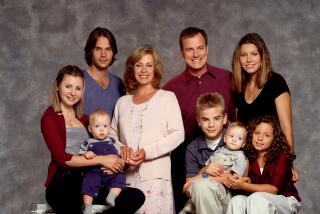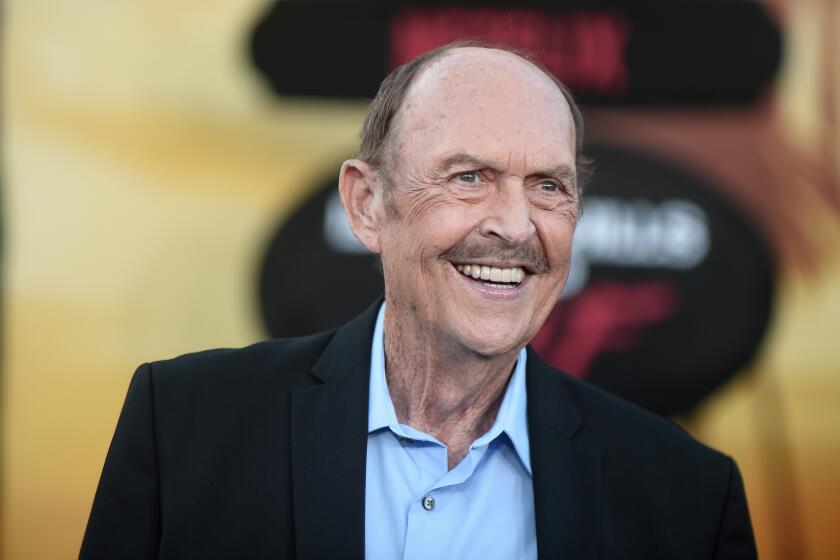Media Project Teaches Safe Screen Sex
NORTH HOLLYWOOD — You’re sitting in a room with 12 other writers--mostly in their 30s and 40s--hammering out a story line, and you wonder: How do kids talk about sex these days? And what do they know?
For writers, producers and network executives groping in the dark when it comes to teen sex scenarios, the Media Project has some answers.
A recent study by the Henry J. Kaiser Family Foundation reported that more than two-thirds of all network shows contain either talk about sex or sexual behavior. Based on the concept that American teens glean most of their information about sex from television, the Media Project aims to educate and provide accurate sexual information to the entertainment industry.
“We try to bring young people’s reality to them,” said Kate Langrall Folb, director of the Media Project.
The tiny nonprofit operation, squeezed into an office on Riverside Drive in North Hollywood, provides information on teen pregnancy, contraception and family planning, abortion, sexually transmitted disease, parent-child communication, adolescent sexuality and abstinence.
The Media Project is sponsored by Advocates for Youth, an international organization, and the Kaiser Family Foundation--an independent national health care research foundation not associated with Kaiser Permanente. It tries to monitor sexual content and serve as a consultant on sexual issues to the television industry. Operating on a $325,000 budget, the group focuses on shows about or watched by teens and young people.
In the last year, the project has offered facts, research assistance or script consultation to “Dawson’s Creek,” “Felicity,” “For Your Love” and “Undressed.”
The project also sponsors panel discussions with teenagers, who field questions from entertainment industry workers.
“They are really the No. 1 people to talk to about sexual health and adolescents,” said Neal Baer, co-executive producer of “ER,” who has worked with the Media Project for years and often appears on its panels.
On Tuesday, the Media Project will honor outstanding portrayals of family planning, sexuality and reproductive health in television programs at the 15th annual SHINE (Sexual Health in Entertainment) Awards at the Skirball Cultural Center.
*
Awards will be presented to shows in the following categories: comedy episode, dramatic episode, series story line, entertainment special, youth program, informational-documentary, daytime drama, talk show and music video. Past winners include “Dharma and Greg,” “ER,” “King of the Hill” and “The Practice.”
This year, the organization will present a special achievement award to Susanne Daniels, president of entertainment at the WB Television Network.
Folb said the project’s goal is to convince television producers to weave safe-sex messages through their stories, rather than devote an entire episode to a safe-sex message. She compared the issue of teen sex to that of seat belts in the 1970s, when the entertainment industry decided to show characters buckling up whenever they climbed into a car.
“It’s more effective that way,” Folb said, citing the power of an “NYPD Blue” episode that showed Rick Schroeder stopping at a store to pick up a Coke and some condoms. “If viewers can see that as part of that character’s lifestyle--that he is never without condoms--they are absorbing that information without thinking about it.”
Yvette Bowser, creator and executive producer of “For Your Love,” said a Media Project panel helped bring authenticity to “The Nightcap,” a comedy episode nominee. The story centers on a couple who have been together for two years, have been tested for sexually transmitted diseases and plan to remain together exclusively. They grapple with the question of whether they should stop using condoms.
“It gave me a sense of comfort, to have someone who is familiar with issues look at the script,” Bowser said of Folb’s involvement.
Similarly, when “Felicity” did an episode on date rape, producers collaborated with the Media Project, airing a number at the end of the show that viewers could call to speak with counselors about sexual assault.
When the episode was first broadcast, the hotline received about 1,000 calls, and when it was rerun, 500 more.
“The Media Project is an amazing resource for anyone who is doing what we are doing,” said J.J. Abrams, co-creator and executive producer of “Felicity.”
“The reality is, for better or worse, our show impacts young people’s lives. Because of that, in dealing with young people’s sexual issues, we would rather err on the side of putting out responsible information, and the Media Project helps us do that.”
*
Writers and producers often scribble notes as teens talk about sex or contraceptives. Recently, the Media Project sponsored a panel, attended by about 110 industry people, on “Guys and Sex,” in which teens spoke in frank terms about love and relationships, Folb said.
“Your experience 20 years ago in the back seat of a Chevy is not relevant now,” Folb said. “If you want to make it interesting, accurate, you need to talk to kids.”
Charlotte A. Conrad, 20, a Media Project intern who often accompanies Folb on visits with writers and producers, recently talked with writers from “Get Real.”
“They wanted to know what my friends and I would do instead of having sex,” Conrad said. “They were very interested in that.”
She told them many of her friends have oral sex rather than intercourse and that schools do not teach about the risks involved.
“I was in their idea room, and they had bulletin boards up, and they were figuring out where the story was going to go--there must have been 12 people there, just staring at me,” she said. “And I just talked about my sex life. That oral sex thing--I was like, ‘Oh, dear God.’ ”
For more information, see the Media Project’s Web site at https://www.themediaproject.com.
More to Read
The biggest entertainment stories
Get our big stories about Hollywood, film, television, music, arts, culture and more right in your inbox as soon as they publish.
You may occasionally receive promotional content from the Los Angeles Times.










